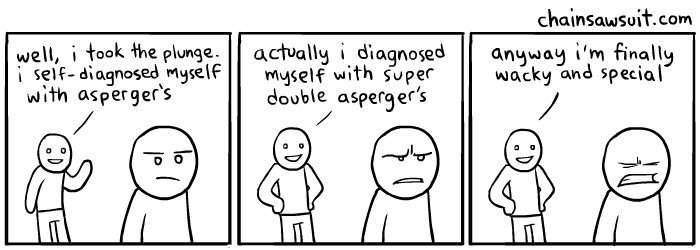Last Thursday, I was talking with someone and I said, in March 1921 or March 1961, life would have been on one level hell for people with Asperger's and Autism, as they would have been totally misunderstood, and people with Severe Autism would have been locked away in the old Asylums as society wouldn't have known what to do with them or where to put then. They would have probably have been classed as been psychologically disturbed or has having a mental handicap as they called it in those non-PC days. As for people with AS, they definitely would have been misunderstood. No questions about it.
I have AS, and I am also pleased I am alive now and not then to have it, because now I can listen to music when in public or in crowded places to block unpleasant noises or sounds out. There were no walkmans back then and even more, the music was crap to listen to! I now know what situations to avoid and which to be in, and what makes my AS worse or which doesn't affect it, such as too many people around me and social situations when and where I lose control. I now have some basic understanding of how to interact and communicate, but I still go on guesswork rather than instinct, like NT's do. Maybe with experience and age I seem to get it right more now than in years ago. You also have more understanding of yourself these days, if you do have the condition, than back in those times, because there is a label and a name for your difficulties.
However, there wouldn't have been as many people about as in 1921 or 1961. Society wouldn't have been "In your face" back then, with a 24-hour media and life wouldn't have as rushed or as hectic. The pace of life would have been slower. I have mentioned being hypersensitive to noise and sound. There wouldn't have been as many cars around or as much traffic or as much hustle and bustle for me to hypersensitive to. In the employment world the condition itself might have been easier to hide in because there were more types jobs around and perhaps it could have been easier to hide in some regards. Also, we now have a service driven economy, which demands face to face communication more than in 1921 or 1961, hence why it is harder to hide AS.
I have AS, and I am also pleased I am alive now and not then to have it, because now I can listen to music when in public or in crowded places to block unpleasant noises or sounds out. There were no walkmans back then and even more, the music was crap to listen to! I now know what situations to avoid and which to be in, and what makes my AS worse or which doesn't affect it, such as too many people around me and social situations when and where I lose control. I now have some basic understanding of how to interact and communicate, but I still go on guesswork rather than instinct, like NT's do. Maybe with experience and age I seem to get it right more now than in years ago. You also have more understanding of yourself these days, if you do have the condition, than back in those times, because there is a label and a name for your difficulties.
However, there wouldn't have been as many people about as in 1921 or 1961. Society wouldn't have been "In your face" back then, with a 24-hour media and life wouldn't have as rushed or as hectic. The pace of life would have been slower. I have mentioned being hypersensitive to noise and sound. There wouldn't have been as many cars around or as much traffic or as much hustle and bustle for me to hypersensitive to. In the employment world the condition itself might have been easier to hide in because there were more types jobs around and perhaps it could have been easier to hide in some regards. Also, we now have a service driven economy, which demands face to face communication more than in 1921 or 1961, hence why it is harder to hide AS.
